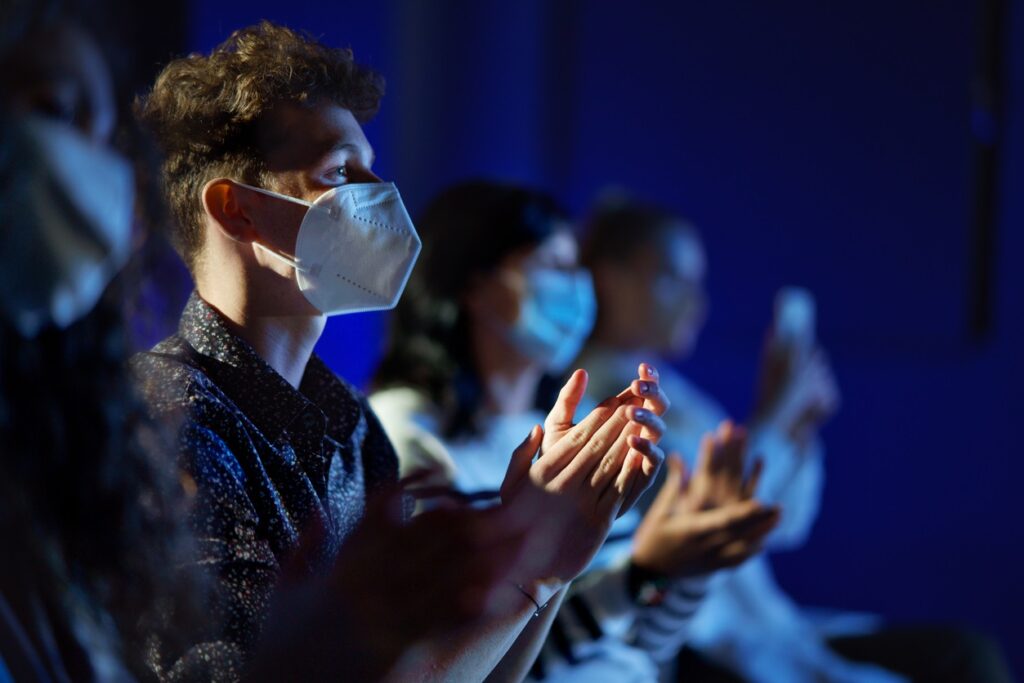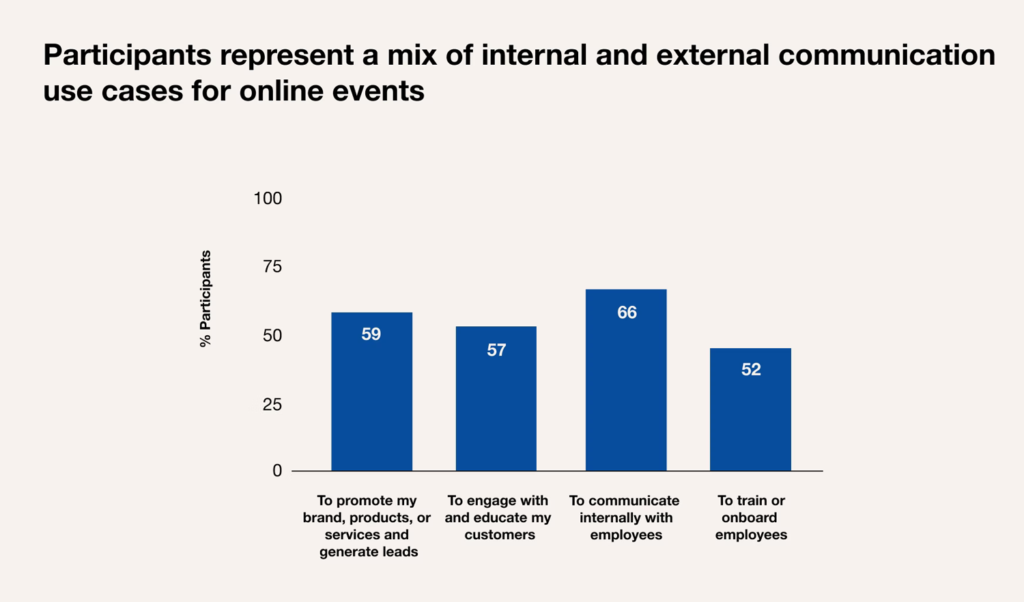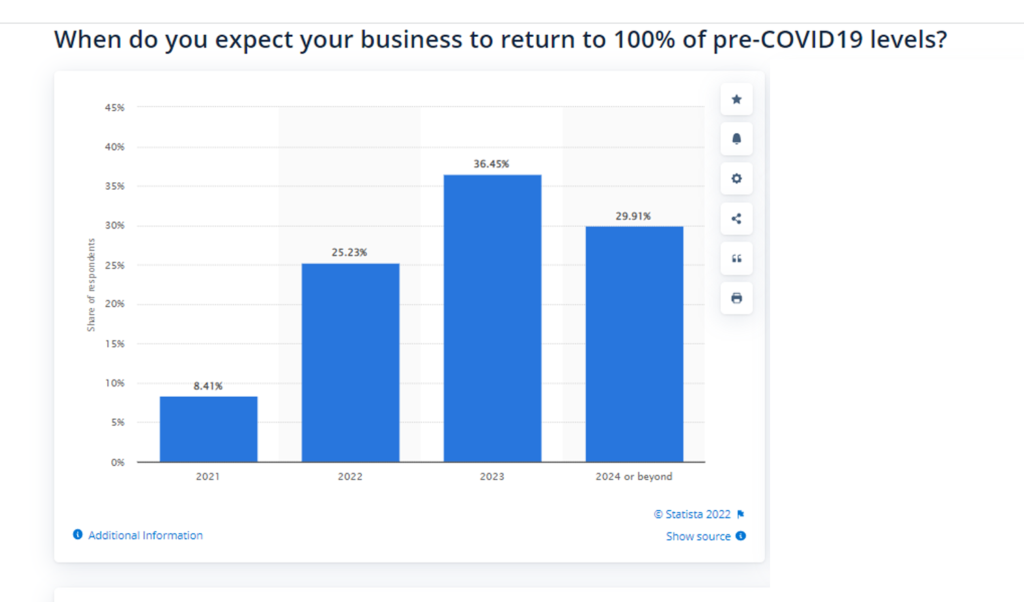
Events are a prime opportunity to promote your business and services, learn about the latest industry trends, and connect with peers to grow and socialize. Post-pandemic event planning involves new challenges as people begin to return to in-person events after Covid.
Between stay-at-home mandates and social distancing concerns, the event industry lost more than $30 billion in revenue during the pandemic. Event planners had to shift quickly to continue to bring education, information, and promotional opportunities to businesses worldwide. Virtual events filled the void, with people attending Zoom meetings and online conferences remotely to gain industry knowledge and keep up with current trends.

As Covid concerns subside, people are venturing back to in-person events in a new post-pandemic world.
Keep reading to learn how to navigate post-pandemic event planning that allows people to gather in a safe environment, gain industry knowledge to grow their business, and generate revenue for continued success.
Key Takeaways
- From attendee stigma to venue logistics, today’s post-pandemic event planner has a new series of challenges they must overcome.
- The key to acquiring a large turnout at your post-pandemic event is building your attendees’ confidence and comfort level.
- Maintain health and safety standards and avoid legal issues by keeping five things in mind when navigating post-pandemic event planning.
3 Challenges of Planning In-Person Events
Although many felt online events were helpful during the pandemic, as Covid cases begin to decline, more people are ready to attend mass gatherings again. In fact, two out of three people said they’re comfortable returning to in-person events. Even so, today’s event planners are facing an entirely new marketplace. A global pandemic still impacts attendee decisions and poses several challenges for post-pandemic event planners. Here are three of the toughest obstacles they have to overcome.

1. Fears for Health and Safety
Safety is one of the greatest concerns of today’s event attendees. People attending live events have to consider their health and safety when traveling. Plane rides put people in close proximity, sharing the same circulated air, and many travelers aren’t yet comfortable taking this step.
As far as the meeting itself, attendees expect events to have stringent plans in place for how to handle social distancing, sanitization of surfaces, and food management. Regardless of how thorough their processes are, event planners have to fight the stigma of mass gatherings and the possibility of people being in close proximity and spreading germs. Allaying people’s fears and enticing them to attend events is a new challenge for post-pandemic event planners.
2. Adhering to Budget
Today’s event guests need to feel more comfortable and confident in their decision to come to an in-person event. To build this trust and accommodate this need, planners must spend more money than in previous events. They have to pay for things like hand washing stations, bottles of sanitizer, face masks, and more intensive cleaning of meeting spaces. This takes a toll on an event budget, especially when overall numbers might be lower because regular attendees may not yet feel ready to gather publicly.
Post-pandemic event planners have to put on the same impactful meetings while lowering the cost of doing business and still convincing more people to come. This is a hefty task and a hurdle to tackle to achieve a successful outcome.
3. Finding a Venue
Locating the perfect venue is always a challenge, but even more so now. Between government regulations and audience demand, many venues need to be large enough to welcome big groups while still having enough room to spread out and socially distance. They also need to accommodate deep cleaning and special food preparation requests to make guests feel comfortable about the venue’s safety.
Unfortunately, the economic toll of the pandemic has left many venues short-staffed, unable to meet the employee demands of a large group event. This narrows the scope of available venues even further. Finding the right building with the space, staff, and amenities to accommodate an in-person event is more difficult than ever before.
Post-Pandemic Event Planning: 5 Things to Consider
As you begin to develop in-person events in today’s “new normal,” the greatest key to high turnout is building attendee confidence. Here are five things you should consider for a successful post-pandemic event.
1. Research Ordinances
City, state, and federal leaders have all taken their own approaches to handling a global pandemic. Some areas require vaccination cards, others have mask mandates in place, and some ask visitors to show proof of a negative Covid test. It’s your responsibility to ensure your event meets legal regulations. If it doesn’t, and someone at your event gets sick, or worse, spreads the virus to other attendees, you could be in serious legal trouble. This would jeopardize your revenue and your reputation.
2. Communicate Expectations to Attendees
Once you know what’s legally required in the city you plan to hold your event; you can create guidelines for your attendees. Meeting Covid regulations can be confusing, so it’s essential to communicate clearly to your guests what’s expected of them before attending and upon arrival. Imagine the consequences you’d face if someone bought a plane ticket and showed up at the venue, only to be turned away because they didn’t know they needed a vaccination card. Clear communication will give people the information they need to decide whether to attend and what steps they need to take to be eligible.
The following video explains in more detail the importance of being an effective communicator:
3. Meet Outdoors
Using an outdoor venue solves a multitude of issues. There’s plenty of room for people to spread out, so social distancing is possible. There’s a constant flow of fresh air, so there’s no concern about breathing circulated air that could potentially be contaminated. Promoting an outdoor event may make more people feel comfortable about attending, and you could see a significant rise in numbers based on venue choice alone. Oversee weather forecasts and have a contingency plan (like large, open-sided tents) in the event of rain.
4. Put Safety First
Promote hygiene and build attendees’ confidence by providing:
- Hand sanitizer: Leave bottles on tables, countertops, and public surface areas.
- Handwashing stations: Foaming soap stations can help people feel better about cleanliness throughout the event.
- Assigned seating: A seating chart means people use the same chair every day of the event, so there’s less contact with others.
- Table-specific water pitchers: Each table using one pitcher helps to minimize the potential spread of germs.
- Pre-wrapped food: Forego the buffet and serve guests individually-wrapped food to minimize exchange and spread of germs.
Offering these amenities can help people feel more confident, comfortable, and satisfied attending your in-person event.
5. Implement Technology
At a time when the public is trying to limit person-to-person contact, technology can be a highly effective way to reduce concerns and conduct business. Paperwork like registrations and surveys can be done on mobile devices. Educational handouts can be uploaded to a website as shareable .pdf files.
Handling the venue check-in and check-out process via an app reduces the number of people standing in line together, minimizes contact, and avoids sharing supplies like pens and credit cards for payment. More than half of today’s consumers use a mobile device to conduct business, so they’re capable of (and would likely welcome) this option throughout your event.
Plan a Successful Post-Pandemic Event
BOOM Communications provides clients with advertising, marketing, and printing solutions that help grow distribution, increase advertising revenue, and grow page count.
Contact BOOM Communications today to learn how we can help you plan a post-pandemic event.
